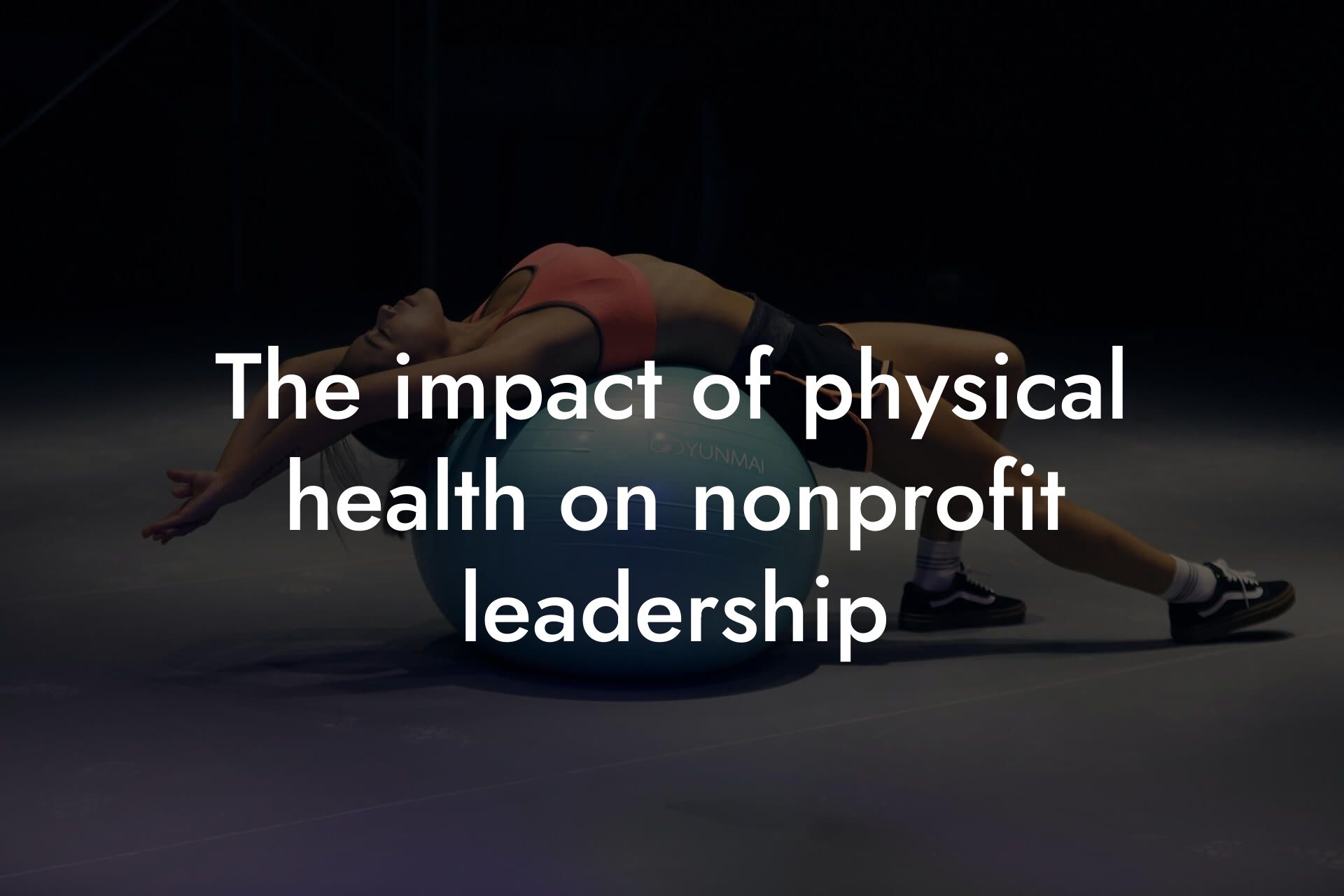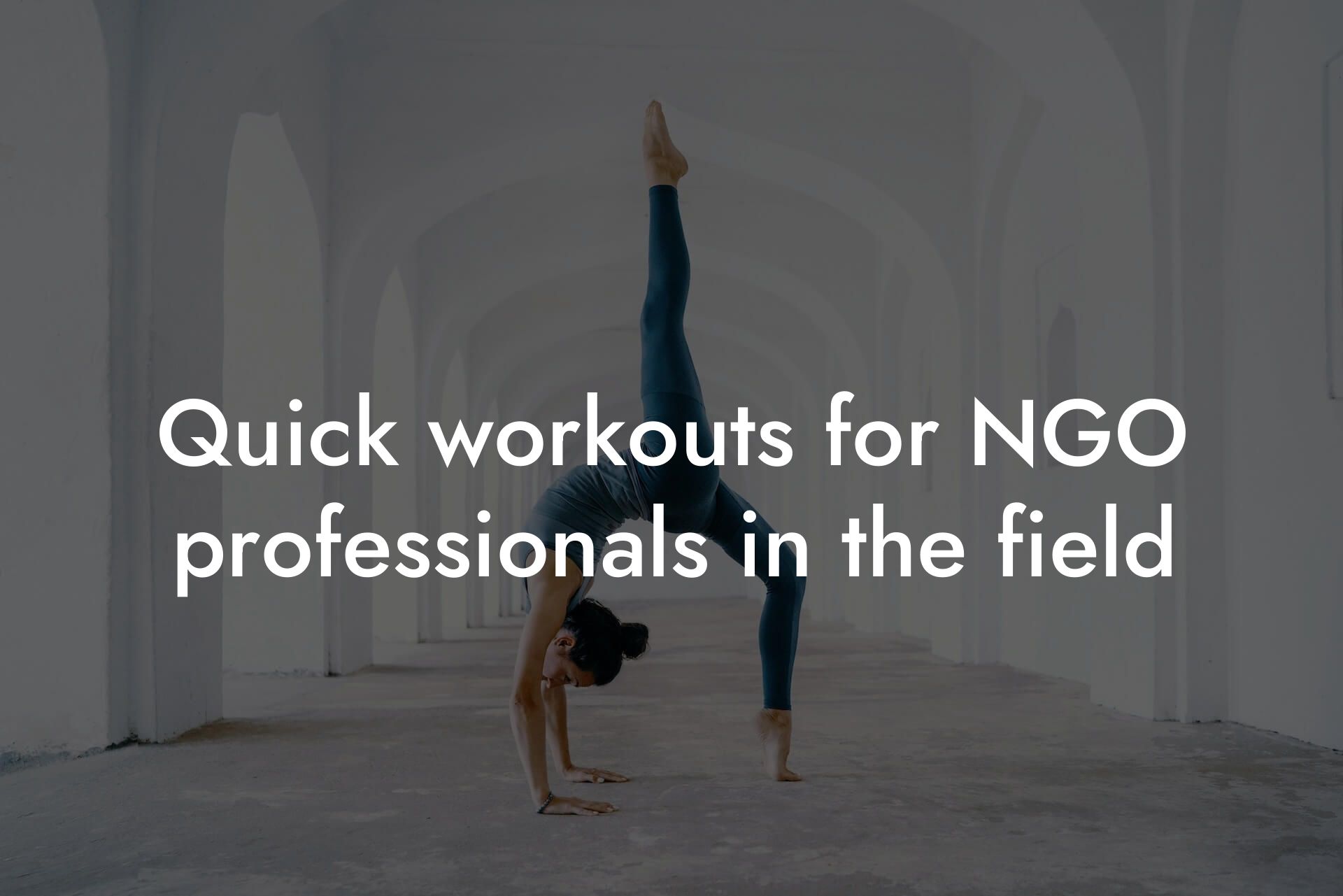As high-earning professionals, you understand the importance of being at the top of your game in every aspect of your life. However, many of us overlook the crucial role that physical health plays in effective advocacy. Whether you're an entrepreneur, executive, or thought leader, your physical health has a direct impact on your ability to advocate for yourself, your business, and your community. In this article, we'll explore the importance of physical health in advocacy and provide you with the tools and knowledge you need to prioritize your well-being and take your advocacy to the next level.
Table of Contents
What is Advocacy?
Before we dive into the role of physical health in advocacy, it's essential to define what advocacy means. Advocacy refers to the act of supporting or promoting a particular cause, idea, or policy. As professionals, you're likely advocating for yourself, your business, or your community in various ways, whether it's through public speaking, networking, or negotiating. Effective advocacy requires a combination of skills, knowledge, and confidence, which are all closely tied to your physical health.
The Impact of Physical Health on Cognitive Function
Physical health has a profound impact on cognitive function, which is critical for effective advocacy. When you're physically healthy, your brain functions at its best, allowing you to think clearly, focus, and make sound decisions. On the other hand, poor physical health can lead to cognitive impairment, decreased productivity, and reduced confidence. Research has shown that regular exercise, a balanced diet, and adequate sleep can improve cognitive function, including memory, attention, and processing speed.
The Role of Energy in Advocacy
Energy is a critical component of effective advocacy. When you have boundless energy, you're more likely to be confident, charismatic, and persuasive. Physical health plays a significant role in energy levels, with factors like nutrition, exercise, and sleep all contributing to your overall energy reserves. A healthy diet provides the necessary fuel for your body, while regular exercise improves cardiovascular health and increases energy levels. Adequate sleep is also essential, as it allows your body to recharge and repair itself.
The Connection Between Physical Health and Confidence
Confidence is a vital component of effective advocacy. When you feel physically healthy, you're more likely to exude confidence, which is critical for persuading others and achieving your goals. Research has shown that physical health is closely tied to self-esteem, with individuals who are physically active and healthy reporting higher levels of self-confidence. This confidence translates to advocacy, allowing you to speak more persuasively, negotiate more effectively, and build stronger relationships.
The Importance of Body Composition in Advocacy
Body composition, including factors like body fat percentage and bone density, plays a critical role in physical health and, by extension, effective advocacy. Excess body fat can lead to decreased energy levels, reduced confidence, and increased risk of chronic diseases, all of which can negatively impact your ability to advocate effectively. On the other hand, a healthy body composition can improve energy levels, boost confidence, and enhance overall physical health. At Tano Performance Group, we use DEXA machine technology to provide professionals with a complete body assessment, including body composition analysis, to help them optimize their physical health and advocacy efforts.
Strategies for Prioritizing Physical Health in Advocacy
Now that we've explored the importance of physical health in advocacy, it's essential to discuss strategies for prioritizing your physical health. Here are a few tips to get you started:
- Make exercise a priority: Aim for at least 30 minutes of moderate-intensity exercise per day to improve cardiovascular health, boost energy levels, and enhance cognitive function.
- Fuel your body: Focus on a balanced diet that includes plenty of fruits, vegetables, whole grains, and lean protein sources to provide the necessary fuel for your body.
- Get enough sleep: Aim for 7-9 hours of sleep per night to allow your body to recharge and repair itself.
- Stay hydrated: Drink plenty of water throughout the day to stay focused and energized.
- Manage stress: Engage in stress-reducing activities like meditation, yoga, or deep breathing exercises to manage stress and maintain physical health.
In conclusion, physical health plays a critical role in effective advocacy. By prioritizing your physical health, you can improve cognitive function, boost energy levels, enhance confidence, and optimize your body composition. At Tano Performance Group, we're committed to helping high-earning professionals like you achieve optimal physical health and advocacy success. By leveraging our DEXA machine technology and expertise, you can gain a deeper understanding of your physical health and develop a personalized plan to take your advocacy to the next level. Remember, your physical health is the foundation upon which your advocacy efforts are built. By prioritizing your physical health, you can achieve greater success and make a more significant impact in your personal and professional life.
Frequently Asked Questions
What is the connection between physical health and effective advocacy?
Physical health plays a crucial role in effective advocacy as it directly impacts our energy levels, mental clarity, and overall well-being. When we are physically healthy, we are better equipped to handle the demands of advocacy, think critically, and communicate effectively. Conversely, poor physical health can lead to fatigue, decreased motivation, and reduced productivity, ultimately hindering our ability to advocate effectively.
How does exercise impact advocacy efforts?
Regular exercise is essential for maintaining physical health, which in turn, enhances our advocacy efforts. Exercise boosts energy levels, improves mental clarity, and increases confidence, all of which are critical components of effective advocacy. Furthermore, exercise can help reduce stress and anxiety, allowing advocates to approach challenging situations with a clearer mind and a more level head.
What role does nutrition play in effective advocacy?
Nutrition is a vital aspect of physical health, and a well-balanced diet is essential for maintaining the energy and vitality required for effective advocacy. A diet rich in whole foods, fruits, and vegetables provides the necessary fuel for our bodies and brains, enabling us to think critically, communicate effectively, and stay focused during advocacy efforts.
How can I prioritize self-care as an advocate?
Prioritizing self-care is crucial for maintaining physical health and avoiding burnout. This can be achieved by setting realistic goals, taking regular breaks, and engaging in activities that bring joy and relaxation. Self-care is not a luxury, but a necessity for effective advocacy, as it allows us to recharge and approach our work with renewed energy and passion.
What are some common physical health challenges faced by advocates?
Advocates often face a range of physical health challenges, including chronic stress, fatigue, and musculoskeletal disorders. These challenges can be attributed to the demanding nature of advocacy work, which often involves long hours, high levels of stress, and a lack of time for self-care. By prioritizing physical health, advocates can mitigate these challenges and maintain their overall well-being.
How can I manage stress as an advocate?
Stress management is critical for maintaining physical health and avoiding burnout. This can be achieved through a range of techniques, including meditation, deep breathing, and exercise. Additionally, setting realistic goals, delegating tasks, and taking regular breaks can help reduce stress levels and promote a sense of calm and focus.
What is the impact of sleep deprivation on advocacy efforts?
Sleep deprivation can have a significant impact on advocacy efforts, leading to decreased productivity, impaired cognitive function, and reduced creativity. When we are well-rested, we are better equipped to think critically, communicate effectively, and approach challenging situations with a clear and focused mind.
How can I maintain a healthy work-life balance as an advocate?
Maintaining a healthy work-life balance is essential for maintaining physical health and avoiding burnout. This can be achieved by setting clear boundaries, prioritizing self-care, and engaging in activities outside of advocacy work. By doing so, advocates can recharge, refocus, and approach their work with renewed energy and passion.
What role does mental health play in effective advocacy?
Mental health is closely linked to physical health, and both are essential for effective advocacy. Good mental health enables advocates to think critically, communicate effectively, and approach challenging situations with confidence and resilience. Conversely, poor mental health can lead to decreased motivation, reduced productivity, and impaired cognitive function.
How can I prioritize my mental health as an advocate?
Prioritizing mental health is critical for maintaining overall well-being and avoiding burnout. This can be achieved by engaging in activities that promote relaxation and stress reduction, such as meditation, yoga, or deep breathing. Additionally, seeking support from colleagues, friends, and family, as well as accessing professional help when needed, can help advocates maintain good mental health.
What are some common mental health challenges faced by advocates?
Advocates often face a range of mental health challenges, including anxiety, depression, and trauma. These challenges can be attributed to the demanding nature of advocacy work, which often involves high levels of stress, trauma, and emotional labor. By prioritizing mental health, advocates can mitigate these challenges and maintain their overall well-being.
How can I build resilience as an advocate?
Building resilience is critical for maintaining physical and mental health, as well as avoiding burnout. This can be achieved by developing coping strategies, seeking support from colleagues and mentors, and engaging in activities that promote relaxation and stress reduction. By building resilience, advocates can approach challenging situations with confidence and adaptability.
What is the importance of community in advocacy work?
Community is essential for maintaining physical and mental health, as well as avoiding burnout. A strong support network of colleagues, friends, and family can provide emotional support, reduce feelings of isolation, and promote a sense of belonging. By building and maintaining a strong community, advocates can recharge, refocus, and approach their work with renewed energy and passion.
How can I stay motivated as an advocate?
Staying motivated is critical for maintaining physical and mental health, as well as avoiding burnout. This can be achieved by setting realistic goals, celebrating successes, and engaging in activities that bring joy and fulfillment. By staying motivated, advocates can approach their work with renewed energy and passion, ultimately leading to more effective advocacy efforts.
What is the role of self-compassion in advocacy work?
Self-compassion is essential for maintaining physical and mental health, as well as avoiding burnout. By practicing self-compassion, advocates can approach challenging situations with kindness, understanding, and patience, rather than self-criticism and judgment. This can help reduce stress, promote relaxation, and increase overall well-being.
How can I prioritize my physical appearance as an advocate?
Prioritizing physical appearance is important for maintaining confidence and self-esteem, both of which are critical for effective advocacy. This can be achieved by engaging in regular exercise, eating a balanced diet, and taking care of one's physical health. By prioritizing physical appearance, advocates can approach their work with increased confidence and self-assurance.
What is the impact of body fat on advocacy efforts?
Excess body fat can have a significant impact on advocacy efforts, leading to decreased energy levels, impaired cognitive function, and reduced confidence. By maintaining a healthy body fat percentage, advocates can increase their energy levels, improve their mental clarity, and approach their work with increased confidence and self-assurance.
How can I improve my physique as an advocate?
Improving physique is important for maintaining confidence and self-esteem, both of which are critical for effective advocacy. This can be achieved through regular exercise, a balanced diet, and proper sleep habits. By improving physique, advocates can approach their work with increased confidence and self-assurance, ultimately leading to more effective advocacy efforts.
What is the importance of bone density in advocacy work?
Maintaining good bone density is essential for overall physical health, which in turn, impacts advocacy efforts. Good bone density can help reduce the risk of injury, improve posture, and increase energy levels, all of which are critical for effective advocacy. By prioritizing bone density, advocates can maintain their physical health and approach their work with increased confidence and self-assurance.
How can I maintain good bone density as an advocate?
Maintaining good bone density can be achieved through a range of strategies, including regular exercise, a balanced diet rich in calcium and vitamin D, and proper sleep habits. Additionally, reducing the risk of injury, managing stress, and engaging in activities that promote relaxation and stress reduction can also help maintain good bone density.
What resources are available to support advocates in maintaining their physical health?
There are a range of resources available to support advocates in maintaining their physical health, including fitness classes, nutrition counseling, and mental health services. Additionally, many organizations offer employee wellness programs, which can provide advocates with access to resources and support to maintain their physical and mental health.
How can I access these resources as an advocate?
Accessing resources to support physical health can be achieved by reaching out to healthcare providers, fitness professionals, and mental health services. Additionally, advocates can research online resources, join advocacy networks, and connect with colleagues and mentors to access support and guidance.
What is the role of Tano Performance Group in supporting advocates?
Tano Performance Group is committed to supporting advocates in maintaining their physical health and overall well-being. Through our website and resources, we provide advocates with access to information, guidance, and support to help them prioritize their physical health and maintain their overall well-being.
Here are some related articles you might love...
- The impact of physical health on nonprofit leadership
- Quick workouts for NGO professionals in the field
- How to stay active during long campaigns or missions
- The connection between fitness and nonprofit impact
- Balancing mission-driven work with personal fitness
- How DEXA scans can benefit nonprofit professionals
- Nutrition tips for maintaining energy during fundraising events
- How nonprofit workers can stay fit during demanding schedules
- Managing stress through physical fitness in nonprofit roles
Zak Faulkner
Zak Faulkner is a leading authority in the realm of physical health and body composition analysis, with over 15 years of experience helping professionals optimise their fitness and well-being. As one the experts behind Tano Performance Group, Zak has dedicated his career to providing in-depth, science-backed insights that empower clients to elevate their physical performance and overall health.
With extensive knowledge of DEXA technology, Zak specializes in delivering comprehensive body assessments that offer precise data on body fat, muscle mass, bone density, and overall physique. His expertise enables individuals to make informed decisions and achieve their fitness goals with accuracy and confidence. Zak’s approach is rooted in a deep understanding of human physiology, combined with a passion for helping clients unlock their full potential through personalised strategies.
Over the years, Zak has earned a reputation for his commitment to excellence, precision, and client-focused service. His guidance is trusted by top professionals who demand the best when it comes to their health. Whether advising on fitness programs, nutritional strategies, or long-term wellness plans, Zak Faulkner’s insights are a valuable resource for anyone serious about taking their health and fitness to the next level.
At Tano Performance Group, Zak continues to lead our Content Team revolutionising how professionals approach their physical health, offering unparalleled expertise that drives real results.




